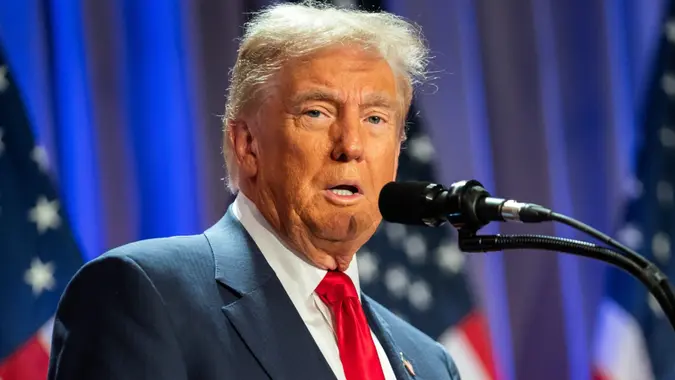3 Changes Trump Could Make to Retirement Regulations

Commitment to Our Readers
GOBankingRates' editorial team is committed to bringing you unbiased reviews and information. We use data-driven methodologies to evaluate financial products and services - our reviews and ratings are not influenced by advertisers. You can read more about our editorial guidelines and our products and services review methodology.

20 Years
Helping You Live Richer

Reviewed
by Experts

Trusted by
Millions of Readers
Retirement is supposed to be a time of rest, relaxation, and enjoyment. Hopefully, you’ve worked hard for many decades and you’ve saved and invested enough money so you can call it quits at work without any financial worries.
America’s 50 Most Expensive Retirement Towns
The state of the economy has a lot to do with people’s ability to retire and how comfortably they’re able to live later in life.
In a recent Gallup News poll, the economy was the most important issue for voters in the 2024 presidential election. Republican voters rated the economy and immigration as the two most important issues. Meanwhile, the top issues for Democrats were democracy and potential Supreme Court justice picks.
In the 2024 presidential election, the electorate spoke loud and clear: President-elect Donald Trump won all seven critical swing states and the popular vote by a wide margin.
There’s no question that the state of the economy affects Retirement. But, how might the incoming Trump administration directly affect current retirement rules and regulations?
Here are three changes you should expect once Trump is sworn in, according to the National Association of Plan Advisors:
Elimination of the Retirement Security Rule
According to the Department of Labor, the Retirement Security Rule works to protect retirement investors from harmful conflicts of interest when receiving advice about their investments in retirement accounts. Under current law, financial professionals are legally required to act as fiduciaries to their clients, making investment recommendations that are in the best interest of the consumer and not their bottom line. It’s expected that this rule will be eliminated under the incoming Trump administration, as it was during his first term.
How ‘Independent Contractor’ is Defined
Under the Biden administration, rules have been put in place to make it harder for employers to classify workers as contractors instead of employees. The idea behind this is to ensure that workers get the benefits and protections they deserve if they perform work for an employer in an employee capacity. However, the incoming Trump administration is likely to eliminate these rules, which are unpopular with Republicans in Congress. If eliminated, companies would have more power in terms of how they classify their workers.
Expanded access to ESOPs
The National Center for Employee Ownership notes that employee Stock Ownership Plans, or ESOPs for short, are an employee benefit that gives workers ownership interest in the company in the form of shares of stock. ESOPs incentivize employees to work as hard as they can to achieve (or exceed) the company’s bottom line. The better the company performs, the more reward there is for employees in the form of stock options. ESOPs are very popular on Capitol Hill and it’s expected that a Trump economic agenda will work to expand access to and promote ESOPs.
 Written by
Written by  Edited by
Edited by 
























